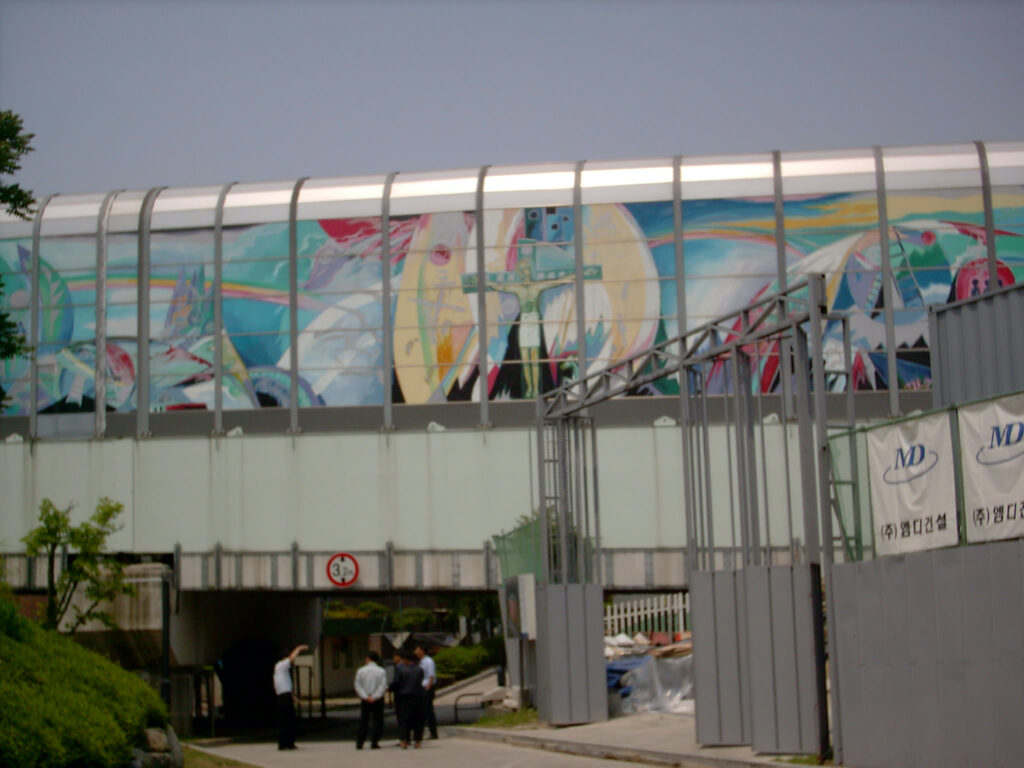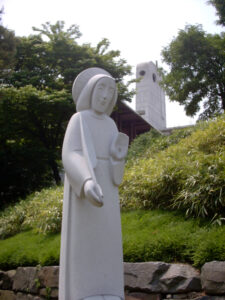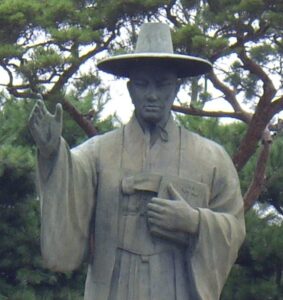Feast Day: September 20
It’s no secret that Christianity and its role in society is shrinking in Europe and much of the Western world. How our faith adapts and grows again remains to be seen. The answer may come from Africa and Asia. The young, vibrant churches there are emerging as the new centers of Catholicism.
South Korea has seen a particularly surprising growth. Less than 1% of Koreans were Christian in 1900. After World War II, the numbers skyrocketed. Today almost 1 in 3 South Koreans are Christian. Its capital boasts the world’s biggest evangelical megachurches, though their growth seems to have stalled. Catholicism, however, continues to grow. Koreans, attentive to the joys of embracing Christ’s love, have also been a strong source of missionary vocations. The Columbans, an Irish missionary order originally founded to bring Christianity to East Asia, now has Korean missionaries in its society who staff outreach centers in the British Isles to bring the light of Christ’s love back to Europe. It is a surprising and joyful twist of history.

Curious Scholars and the Korean Adoption of Christianity
The most remarkable part of the Korean story of Christianity is that it came without outside missionaries. After a devastating invasion by the Japanese in the 1590s, Korea decided foreign barbarians had nothing to offer but death and corruption. Korea’s rulers cut the kingdom off from most of the outside world except for one key ally: China. The Chinese also saw the rest of the world as lesser barbarians and closely regulated foreign activity, but they allowed in more trade and some visitors—including Catholic scholar-priests. So an indirect channel for Western influence opened up. Jesuits and others translated books of western science, religion, and philosophy into Chinese, and from there the Confucian-Buddhist elite of Korea could learn of the rest of the world.
In Korea, scholars were the elite. The noble yangban class gained promotion based on their mastery of Confucian scholarship, with military matters a distant second-best occupation and commercial riches too vulgar an enterprise to even be acknowledged as a path to prominence. Most of the yangban looked at foreign scientific systems of thought as inferior and, after healthy debate, put them aside. However, a small group grew intrigued with the whole Western system of thought: philosophy, science, and religion combined together (which, despite modern myths of a conflict between science and religion, is how most European intellectuals thought in the 1700s).
In 1784, one young scholar named Yi Seung-hun traveled to Beijing as part of the annual tribute delegation. Unofficially, he came to seek out a Catholic priest and receive baptism. He wanted to live out what he had read. He returned to Korea with a chest full of Christian books, crucifixes, and other Christian paraphernalia. After a long debate, he convinced his father of the truth of Christ and they started the first church in Korea, turning their home into a meeting place for interested scholars. When the first priest in Korea, a Chinese man named Zhu Wenmiao, arrived a decade later, he estimated that 4,000 people had embraced the faith.

A Century of Persecution
Yi and his father shielded their community at first by virtue of their elite social status. That wasn’t enough in the end. Christianity challenged core Korean customs—especially ancestor worship—and its subversion of the rigid social hierarchy as Yi welcomed lower-class Christians and women as equal friends. In 1801, the government captured and executed Yi along with several hundred other Korean converts. Persecution continued for the next century and even increased as Catholicism stubbornly continued to grow. Perhaps 10,000 Koreans died at the hands of their own government for choosing to follow Jesus; of those, 103 have been officially canonized and more are under consideration.
These Korean Christians nourished their faith with the Word of God and mutual love alone for they had to mostly survive without the sacraments. The Korean government ruthlessly hunted illegal foreigners, especially priests. Some French missionaries managed to enter the country in the 1830s, hiding by day, traveling by night, and speaking only with members of the community. Many Korean Christians never saw a priest. They baptized one another (for anyone can baptize), prayed to God together, and learned from lay catechists who circulated texts written in the simple language of the masses.
St. Andrew Kim Taegon, a member of the yangban scholar elite and the son of a martyred convert, secretly traveled to the Portuguese enclave of Macau at the age of 15. There the Jesuits trained him over the next decade and ordained him as the first native Korean priest. Then he went home. He lived only 13 months before the Korean government caught him. As he awaited execution, he reminded his fellow Catholics to trust in God and to live truly as Christians. If he had worked with foreigners, as the government claimed, it was only out of love and so that he and his companions would live eternally. In September 1846, he was taken to Jeoldusan—literally “the hill of decapitation”—where the executioner beheaded him and tossed his body into the river below.

I wish I could say the story of persecution ended in the 1800s. It did not. The Japanese brutally occupied Korea in the 1900s and proved unfriendly to Christianity. After World War II, America occupied the southern half of the country and helped the South Koreans create a society that embraced religious freedom and (eventually) democracy. North Korea, however, fell into the Soviet sphere. The Communist government there, in line with its atheistic counterparts in Europe, saw religion as a threat to be exterminated. It persecuted Christians from the beginning and continues to do so today. The Korean War (1950-53), in which North Korea invaded the South, saw another wave of martyrs. Many of these, including missionary priests from the Columbans and other orders, are currently under consideration for canonization.
Lessons of Hope from the Blood of Martyrs
Christianity only enjoyed its exponential growth in Korea when the postwar South Korean government granted religious toleration. In times of persecution, Christianity remained a small minority despite its successes. To be fair, I don’t know how many of us would have the courage to continue our faith knowing our country would kill us for it. It can be difficult enough to profess one’s faith publicly even when the only punishment for it is social scorn. Therefore, preserving religious freedom is an imperative for helping ourselves and our brothers and sisters have the courage to keep our faith alive. That is the first lesson I would take from the troubled history of Korean Christianity.
Yet the Korean martyrs also remind us that God’s grace and His Good News are powerful things indeed. In the face of lethal persecution, without an entrenched Christian culture, without even the grace of sacraments beyond baptism or substantial support from the Church outside their country, these brave Korean men and women clung to the Father. They spread their eternal hope to others out of love because they knew they had found something worth more than everything else in their lives combined. They couldn’t love their neighbors and not share it with them, even if doing so cost them their lives.
Do we have that same conviction and joy? Do we recognize that God has shared a life and message with us that’s simply too good not to share? If we have the grace to do that, Christianity in our countries will never die, even when we move on to our eternal home.
If you have a response, thoughts, or questions, please comment at the bottom of the page. Consider subscribing below to get weekly email notifications about new reflections and other news.



Dear Dr Eric
That is such a wonderful story.
I think that we ‘cradle Catholics’, having not known life without our faith, can be guilty of not fully appreciating that amazing gift of God, whereas converts recognize the difference in quality of life when they become members of the Church.
I, for one, need to pray for that same conviction and joy as those brave Koreans who recognized that God has shared a life and message with us that is simply too good not to share.
I look forward to your next reflection.